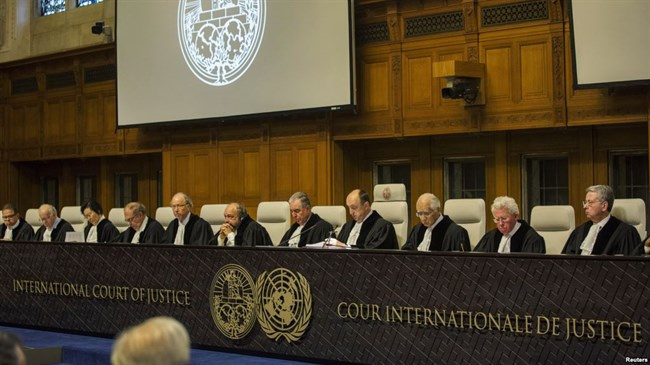How Iran Can Build Up on the ICJ Verdict

By Reza Nasri*
When the International Court of Justice (ICJ) issued its order in the case of Iran vs. United States (Nuclear Sanctions Case), many were quick to say that the ‘provisional measures’ announced by the court are not binding or that the court has no power to enforce its ruling.
It is said that if the US does not comply with the ICJ order, Iran can refer the case to the United Nations Security Council, where the US can veto any decision. This is a hasty judgment on the part of those making such points. It is essential for them – especially if they hold an official position or refer to the law – to exercise more prudence so that their words will not act as an obstacle for Iran’s foreign diplomacy later.
Firstly, ICJ has ruled in the past that the ‘provisional measures’ are binding as it can be seen in the LaGrand case in 2001. The case removed the uncertainty that existed regarding the interpretation of Article 41 of the English text of the Statute of the ICJ.
The English text of the statute of the International Court of Justice implies that provisional measures of the court are not binding, while the French text implies that they are.
On June 27, 2001, faced with a contradiction between two equally authentic texts of the statute, the court considered which interpretation better served the objects and purposes of the statute, and hence found that they are binding. This was the first time in the court’s history it had ruled as such.
Secondly, if Iran was to refer the case to the UN Security Council, as a result of US non-compliance, it is debatable whether the US would have the right to veto it as the county is ‘a party to a dispute’.
Article 27 (3) of the UN Charter states that “decisions of the Security Council on all other matters shall be made by an affirmative vote of nine members including the concurring votes of the permanent members, provided that, in decisions under Chapter VI, and under paragraph 3 of Article 52, a party to a dispute shall abstain from voting.”
As a result, to say that the ICJ order cannot be enforced or that the US can veto any vote issued in favor of Iran in the Security Council is a hasty interpretation which, in case made by authorities, can be used by the US against Iran later.
The development of international law in recent years can enable Iran to reason with strong evidence that the US shall refrain from voting in the Security Council, even if there is precedent for applying vetoes on similar cases in the past.
Thirdly, some are of the opinion that referring the case to the Security Council is not possible because Article 94 (2) of the UN Charter says that member states can do so in case ICJ has made a ‘judgement’ – a word used for the ‘final’ decision of the court.
Article 94 (2) of the UN Charter states that “if any party to a case fails to perform the obligations incumbent upon it under a judgment rendered by the Court (ICJ), the other party may have recourse to the Security Council, which may, if it deems necessary, make recommendations or decide upon measures to be taken to give effect to the judgment.”
Again, this interpretation is debatable because of the LaGrand case in 2001, where the court said its provisional measures are legally binding. In other words, this interpretation runs counter to the interpretation of the ICJ for its provisional measures.
Fourthly, even if the US – after all these steps – succeeded in wielding its veto against Iran in the Security Council, Iran still could use the mechanism of ‘uniting for peace’ and refer the case to the United Nations General Assembly instead of the Security Council to pursue its demands.
In conclusion, to say that the ICJ provisional court cannot be enforced and that it is only a symbolic gesture is not correct and must be revised.
*Reza Nasri is an international law expert from Geneva’s Graduate Institute of International and Development Studies.
Source: Iran Daily

